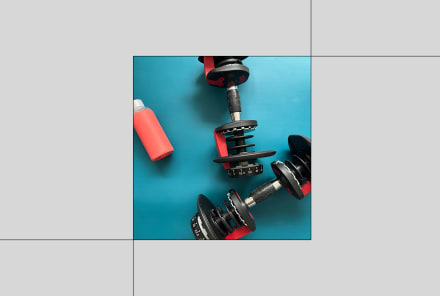Advertisement
16 Ways To Stop Wasting Water At Home & Why It's So Important

Years ago, a teacher shared a water experience that had always stayed with her and has since stayed with me.
Shortly after arriving at college, she remembered brushing her teeth next to her new roommate. "What are you doing?" her roommate asked her, gesturing to the tap she'd left on as she brushed. My teacher didn't realize what the big deal was until she looked over at her roommate's tap and saw it was shut off. The roommate came from a dry area in California, my teacher from a water-rich town on the East Coast. By the time they met each other as teens, they'd formed vastly different views on the same resource.
This story illustrates why water can be a tricky resource to talk about. Unless you live in a water-stressed area, it's easy to assume that it doesn't really matter how much of it you use on a daily basis, that the taps will always just keep on flowing.
Of course, there are plenty of good reasons to waste less water at home—no matter where you live. Here, experts unpack a few of the most important and share their favorite strategies for conserving water, beyond just turning off the tap when you brush.
Statistics about water waste.
Over the last century, global water consumption has skyrocketed with industrialization and population growth. According to data from the World Bank, we are now using at least 495% more water than we were at the beginning of the 20th century. As of 2014, the country withdrawing the most freshwater was India, followed by China and then the United States.
In the U.S., the Environmental Protection Agency1 (EPA) estimates that the average family household now goes through more than 300 gallons of water every day. That's enough to fill about 10 standard backyard swimming pools each year. While it's tough to say how much of that water is "wasted" and used unnecessarily, it's not hard to believe that most of us could fulfill our basic needs using far less.
Why we all need to waste less water.
In water-scarce areas where the demand for freshwater outpaces supply, it's easy to understand why wasting the resource is harmful. If you live somewhere that's naturally dry and needs to import its own water supply or is dependent on variable rainfall, you likely place a lot of value on water conservation already.
But if you live in a place that isn't water-stressed (you can find out the overall water risk of your region on this map), you might be wondering why your personal water use matters so much. This is a question that Newsha Ajami, Ph.D., a hydrologist and the chief development officer of Berkeley Lab's Earth & Environmental Sciences Area, thinks about a lot.
After more than a dozen years studying water demand and urban water policy, she's come to the conclusion that small household changes can add up to make a huge difference on the community level. Consider, for example, the fact that if your home gets public water, it takes a fair amount of energy to transport that water to you, and whisk it away when you're done with it. And since all the water piped into our homes—from sink to toilet—is potable (ready to drink), it also requires a fair amount of chemicals to clean. Every time we waste water, we waste these resources, too.
Ajami emphasizes that thinking about your water use in the context of this whole system is the key to understanding the importance of your tap.
"The less we use, the less impact we are putting on the environment from the top and the bottom," she tells mbg. If many people in a community reduced the amount of water they used at home, it would significantly lighten that community's water demand. And in the future, as the population continues to grow and climate change threatens water supplies around the country and the world, the more we can reduce the pressure on our local water systems, the better.
3 top ways water is wasted.
Curious where water tends to get gobbled up the most? Here are three major ways we lose and use water you might not have considered.
It's lost on the way to our homes.
Issues like leaky pipes and outdated infrastructure mean that a fair amount of water is wasted before ever reaching its destination.
Nanda Aung, a corporate water stewardship associate at the World Resources Institute, explains that the amount of water lost in transit differs from place to place, but it's usually a significant figure. In the Netherlands—where Aung works to help businesses achieve their water reductions goals—he says that about 4 to 6% of usable water disappears on the journey from water treatment plants to homes, while as much as 40 to 60% of water can get lost in transit in developing countries like India.
It's used to water lawns.
While individuals don't have much say over how their water gets to them, this next waste source is directly in our control.
Ajami points out that an incredible 50% of household water use in the U.S., on average, is used outside to water lawns. "The biggest irrigated crop we grow in the U.S. is actually grass," Ajami explains, pointing to a study published in the journal Environmental Management2 in 2005.
Now, some people might not consider a green lawn to be a waste of water—but ask yourself: Do we really need to be using drinkable water to keep our lawns looking pristine? Not only are thirsty turf lawns a waste from a water perspective, but they also come with a hefty carbon footprint and don't do local wildlife any favors.
It leaks from our pipes.
Those tiny drip-drip-drips of your shower head or kitchen faucet can really add up. According to estimates by the U.S. EPA3, the average family loses 9,400 gallons of water per year to household leaks—equivalent to the amount used for 300 loads of laundry.
How to cut back on your water usage.
Beyond repairing leaks and switching over to drought-resistant ground covers, there are tons of other strategies you can employ to waste less water at home. To home in the ones that will have the greatest impact, Aung recommends first considering your unique water usage.
"There is no fixed formula for reducing water demand, so start by assessing your own behavior," he suggests. Do you tend to take long showers? Do you do a lot of laundry—even when the machine isn't full?
Once you have a better understanding of your personal water footprint, you can employ any of these expert-approved steps for reducing it:
- Don't leave the tap on when your brushing teeth
- Replace your toilet with a vacuum toilet or a high-efficiency toilet that uses less water
- Install energy-efficient appliances in your own home (or, if you rent, ask your owners to install them; it's a cost-saving measure as much as a water- and energy-saving one!)
- Only flush the toilet when necessary
- Only run your dishwasher when it's full
- Only run your washing machine when it's full (preferably with cold water)
- Take shorter showers
- As you're waiting for your shower to warm up, collect the water in a bucket for household use (you can water your plants with it, for example)
- Swap your shower head with a low-flow one
- Swap out grass for more water-efficient landscaping
- Fill your sink with water when washing dishes instead of letting the tap run
- Repair leaky pipes at home
- Capture rainwater to use around the house and garden
- Demand changes on a community level by advocating for policies that fix municipal water leaks, make energy-efficient appliances more accessible, and make water meters in multi-unit buildings the norm to make it easier for folks to keep track of how much water they're using
- Educate yourself about water waste by reading books like The Big Thirst and The State of Water and watching documentaries like Flow: For the Love of Water
- Be a more conscious consumer in general: Buy food grown using regenerative, water-saving techniques (approximately 70% of the world's freshwater currently goes toward agriculture), support local businesses, and look for goods that were produced close to home, and buy less stuff in general. After all, everything you own took water to create and transport to you!
The bottom line.
Depending on where you live, you may not feel super incentivized to reduce your water use. But when you consider the role that water plays in the grand scheme of things, it becomes clear that we all need to use it wisely to set ourselves up for a brighter future.
Watch Next
Enjoy some of our favorite clips from classes
Enjoy some of our favorite clips from classes
What Is Meditation?
Mindfulness/Spirituality | Light Watkins
Box Breathing
Mindfulness/Spirituality | Gwen Dittmar
What Breathwork Can Address
Mindfulness/Spirituality | Gwen Dittmar
The 8 Limbs of Yoga - What is Asana?
Yoga | Caley Alyssa
Two Standing Postures to Open Up Tight Hips
Yoga | Caley Alyssa
How Plants Can Optimize Athletic Performance
Nutrition | Rich Roll
What to Eat Before a Workout
Nutrition | Rich Roll
How Ayurveda Helps Us Navigate Modern Life
Nutrition | Sahara Rose
Messages About Love & Relationships
Love & Relationships | Esther Perel
Love Languages
Love & Relationships | Esther Perel











